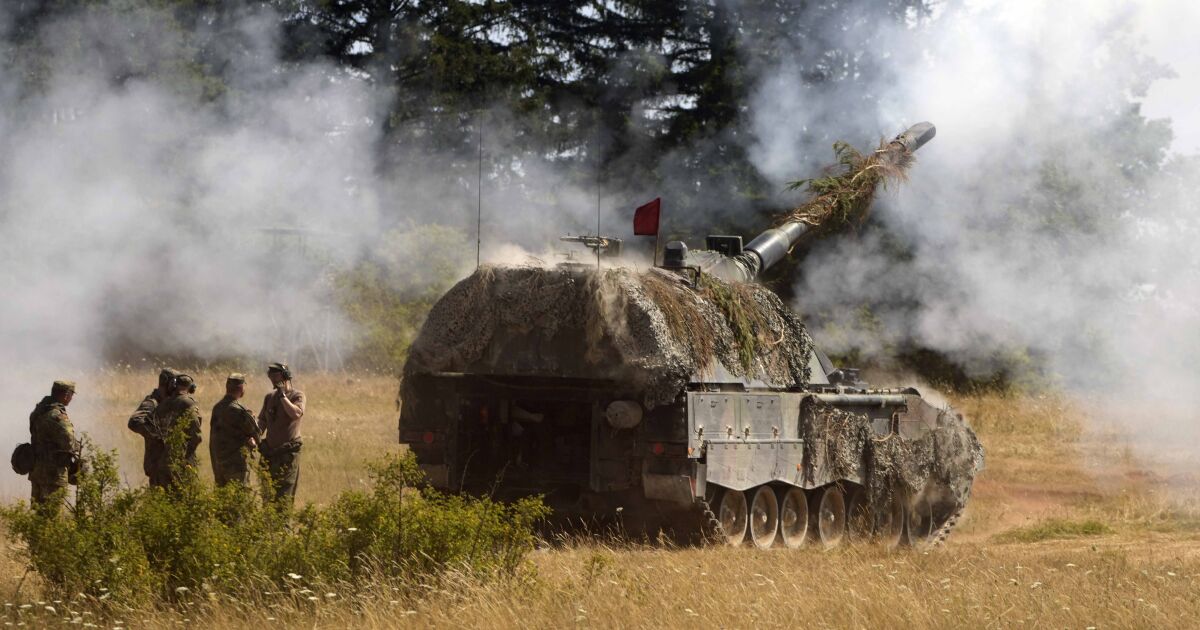The war is 'jolting' Germany back into the military game, which is never a comfortable process:
Russia’s invasion of Ukraine is jolting Germany into rebuilding its military
In some ways, it was a perfectly ordinary conversation — a trio of bright, ambitious German high school kids thinking out loud about what they might do after graduation. But their discussion reflected a sea change in social attitudes: They were considering joining the military.
A decades-old aversion to serving in the German armed forces — the scourge of Europe during World War II, underfunded and neglected after the Cold War’s end — is swiftly reversing itself as a result of the
war in Ukraine.
These three 18-year-olds, all of them set to finish high school next year in the northern town of Koethen, are coming of age just as Germany,
Europe’s economic powerhouse, is aiming to rebuild and revitalize its military after generations of lingering
Nazi-era stigma.
One of the students, Steven Foerster, said he was drawn to high-tech opportunities in the Bundeswehr, Germany’s federal defense forces. His classmate Sarah Naumann thought joining up might be a good way for her to pursue medical studies. Jakob Fischer, another student, said he could see himself serving in a combat unit.
“The negative image isn’t really there anymore,” said Foerster. Naumann concurred: “The German army has become attractive again.”
Despite Germany’s
strong postwar tradition of pacifism, Russia’s full-scale invasion of Ukraine nearly seven months ago shocked the public into thinking very differently about national defense.
Three days after the war began, Chancellor Olaf Scholz — in office for less than three months — delivered a speech dubbed
“Zeitenwende,” or watershed. With a single stroke, Germany embarked on the hitherto unthinkable: pledging to send heavy weapons to Ukraine and promising a $100-billion cash infusion for the military.
Those moves appear to have solid public backing. Polls suggest about two-thirds of Germans back the export of weapons to Ukraine and sanctions against Russia. The country has absorbed a flood of Ukrainian refugees. And according to a survey by the polling firm Civey, nearly a third of Germans say they have a better image of the Bundeswehr than before the Ukraine war.
In the not-so-distant past, the reputation of the Bundeswehr — the successor force to the infamous Nazi-era Wehrmacht — was less than stellar. Some members, especially conscripts, did their best to keep a low public profile. Few young people aspired to join. Starved of funds, shrunken in size, the military was almost invisible to the public.
“There was no pride in this army,” said Carlo Masala, a professor of international relations at Bundeswehr University in Munich.
After the depredations of World War II, framers of the country’s postwar order initially envisioned Germany having no military at all. But a divided Germany was the Cold War’s ground zero for a tense standoff between the West and the members of the Warsaw Pact, led by the Soviet Union. At its height, the Bundeswehr belonged to the former West Germany and fielded almost half a million troops.
After the fall of the Berlin Wall and German reunification, though, troop strength was whittled down to 180,000, and modernization efforts stalled. The military draft remained in effect until 2011, but many young Germans sought to avoid conscription by applying to do some form of civilian service instead, such as working in a hospital.
“This distancing is part of our postwar culture,” Masala said.
At the same time, Germany’s security framework rested on the hope that engaging in vigorous trade with Russia would lead Moscow to eschew overt, large-scale aggression. The North Atlantic Treaty Organization’s Article 5, its foundational pledge, assures mutual assistance to all members in the event of an attack. That gave Germany a security umbrella but also fed complacency, analysts said.
Russia’s invasion of Ukraine on Feb. 24 caught the German political and military establishment off guard, even as senior officials acknowledged that alarms had been blaring since
Moscow’s 2014 illegal annexation of Ukraine’s Crimean peninsula.
The day after the war started, army chief Lt. Gen. Alfons Mais delivered a scathing verdict, calling the Bundeswehr “more or less bare.” Writing on the jobs platform and the social network LinkedIn, he declared: “We all saw it coming,” lamenting that Germany had failed to make needed preparations.
In January, a month before the invasion, a ministerial report on the readiness of the armed forces said only about three-quarters of the Bundeswehr’s main weapon systems were operational. Less than a third of its warships and only 40% of its helicopters were deemed “fully operational.” During the
August 2021 evacuation mission in Kabul, in which Germany took part, only 10 of 30 transport aircraft were usable.
Masala recalled a major NATO exercise in Norway a few years ago, to which the Bundeswehr sent more than 5,000 soldiers but had to scrounge up basic supplies such as gloves from other units.
“Seventy-five percent of our lectures are now on Ukraine, on national defense,” he said. “Not about our missions abroad, in Mali, Kosovo, or when we were in Afghanistan.”
Even before the current Ukraine war, German service members in uniform could ride the train for free. But Sehmisch said interactions between uniformed troops and the public have taken on a different character these days.
“We get nods from fellow travelers, and the other day another passenger on the train even bought me a coffee,” he said. “The war in Ukraine makes people realize how important it is to have an army to protect them.”
After decades of neglect and the stigma of its Nazi past, Germany warms up to the idea of rebuilding its army, thanks to the war in Ukraine.

www.latimes.com


www.spiegel.de

